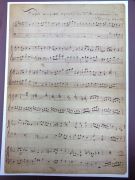Samuel Wesley’s Fugue for Mendelssohn
Thursday, April 18, 2024

The following is by Dominic Newman and originally appeared on the British Library’s Music blog (© British Library Board, Creative Commons Attribution Licence).
Just before the end of his life, Samuel Wesley – the elder composer, 1766–1837, the middle of the three main Samuels in the Wesley dynasty – experienced something of a revival in his spirits. Since his adolescence he had suffered long periods of depression alternating with stretches of creative activity and success. In the last two decades of his life, however, two serious breakdowns, one following the loss of an infant child in 1816 (which led to his confinement for a time to a mental asylum), and a second in 1830 (after which he seldom appeared in public), effectively brought his performing and composing career to an end. But in the summer of 1837, aged 71, the shadows lifted, his powers returned, and he enjoyed a final flourishing of activity and of relative contentment.
One newly-catalogued music score originates with the last major public event of Wesley’s life, and possibly one of the happiest. It is a score of a Fugue in B Minor for organ ‘composed expressly’ for Wesley’s fellow composer-organist Felix Mendelssohn (1809–1847), whom he met during the latter’s second visit to London in September 1837. It is not known exactly how the meeting came about, but was possibly arranged in advance by Wesley’s daughter Eliza, who is known to have met Mendelssohn on 7th September. Wesley composed the fugue on the 9th, and the two composers met on the 12th, after Mendelssohn’s organ recital at Christ Church, Greyfriars (just opposite St. Paul’s Cathedral). Although it is not known whether Wesley played his Fugue for Mendelssohn, he did improvise at the organ after the recital. The younger composer was deeply impressed, but according to Eliza her father only said, ‘Oh, Sir, you have not heard me play; you should have heard me forty years ago!’
The present manuscript (British Library shelfmark MS Mus. 1933) is most likely in a contemporary copyist’s hand, though an inscription on folio 4 is in Wesley’s own writing. It complements his own autograph manuscript at shelfmark Add MS 35007, f. 99b.
Wesley died less than a month after the meeting, on 11 October 1837, seemingly a happier man than he had been for some years. Mendelssohn, only 28 at the time of their meeting, followed him only slightly over ten years later, and at scarcely more than half Wesley’s age, on 4 November 1847.

The opening of a ‘Desk Voluntary’ in Wesley’s own hand (MS Mus. 1933, f. 2v.)
Reference sources:
Olleson, P., & Pelkey, S. (2001). Wesley, Samuel. Grove Music Online. Retrieved 5 Oct. 2023, from.
Olleson, P. (2004, September 23). Wesley, Samuel (1766–1837), composer and organist. Oxford Dictionary of National Biography. Retrieved 5 Oct. 2023, from.
Brown, Geoffrey Ernest, ‘The organ music of Samuel Wesley’, (Durham University thesis, 1977), pp. 168–169. Retrieved 6th July 2023 from Durham Theses.
Dominic Newman, Music Manuscript and Archival Cataloguer
Image above: The opening of Samuel Wesley’s ‘Fugue composed expressly for Dr. Mendelssohn’ (MS Mus. 1933, f.1)
Share Tweet EmailCategory: Library collections

